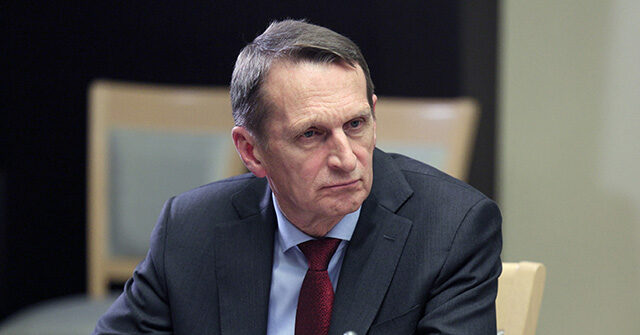Russian Foreign Intelligence Service (SVR) Director Sergey Naryshkin on Tuesday met in Havana with Cuban figurehead “President” Miguel Díaz-Canel, who described the Russian official as a “good friend” of Cuba.
Although details of the encounter were not publicly disclosed by Russia or Cuba, the meeting occurs at a time when the communist Castro regime is seeking increased aid from one of its top benefactors to help offset the dramatic collapse of its economy, caused by over six decades of communist mismanagement.
Martí Noticias described Naryshkin as a decades-long ally of strongman Vladimir Putin and a “key player in the gears of Russian power” albeit not a very visible person, as well as one of the key architects of the Russian-Cuban rapprochement of the last decade.
Diplomatic sources told Martí Noticias that Díaz-Canel and Naryshkin discussed cooperation in the fields of cybersecurity, social media surveillance, and digital content control — the latter being a field where Russia has offered “extensive technical assistance to like-minded governments, such as Cuba, Venezuela, and Belarus.”
“It is a pleasure for us to welcome you here on this visit to Cuba, together with the delegation accompanying you; and even more so with the satisfaction that we are welcoming a good friend of Cuba,” Díaz-Canel said, according to the Cuban presidency. “This visit is very propitious to exchange and follow up on conversations that we have had in the past. It also demonstrates the excellent level of dialogue that exists between our nations, and the excellent state of our relations.”
Díaz-Canel, speaking on behalf of Cuba’s nonagenarian dictator, Raúl Castro, extended a greeting to Putin and expressed gratitude for Russia’s continued “unconditional support” for the Cuban regime against the U.S. “embargo” and Cuba’s designation as a state sponsor of terrorism (SST). The SST designation was rapidly reinstated by President Donald Trump during the first hours of his second term after former President Joe Biden had Cuba removed from the list in the last days of his administration.
Martí Noticias pointed out in its report that Naryshkin’s visit to Cuba and his meeting with the regime’s “president” occurs in the context of persistent repression against Cuban civil society, particularly after the July 2021 nationwide wave of peaceful protests against the Castro regime. As of May, the non-government organization Prisoners Defenders has recorded 1,158 political prisoners of the communist regime.
“Observers warn that Russian-Cuban cooperation could translate into new technological tools for tracking, censorship and selective repression of dissident voices, replicating models already implemented in Russia, Belarus, and Iran,” Martí Noticias reported.
“While other diplomats limit themselves to smiles, promises and protocols, Narishkin has operated with persistence, stealth and efficiency, weaving a web of interests that places Cuba once again on the Kremlin’s strategic chessboard,” the outlet continued.
In early June, the Russian regime announced that Cuba joined over ten other countries – including Venezuela, North Korea, and Nicaragua – in supporting Russia’s “International Cooperation in the Field of Information Security.” Russia did not disclose the specifics of the agreement but claimed it stood in support of the United Nations Convention Against Cybercrime, which has been highly criticized by the United States and Europe.
The encounter between Naryshkin and Díaz-Canel occurred hours after President Trump signed a national security memorandum restoring the tough stance adopted during his first term against the Cuban regime and reversing concessions granted to the Cuban communists during the administration of former President Joe Biden.
Some of the measures implemented in President Trump’s memorandum include a strict ban on any direct or indirect financial transaction involving any entity controlled by the Cuban military and a statutory ban on U.S. tourism to Cuba, a crucial revenue source used by the Castro regime to fund its authoritarian rule of Cuba and repression of dissidents.
According to Díaz-Canel, the measures imposed by President Trump’s memorandum allegedly seek to cause “the greatest possible damage and suffering to the people.”
Christian K. Caruzo is a Venezuelan writer and documents life under socialism. You can follow him on Twitter here.



